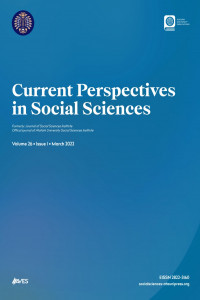Disillusionment and Silence in British Trench Poems: Voices from World War I
British trench poets who had first-hand experiences in World War I (1914–1918) produced significant poetic works in terms of depicting the realities of battlefields throughout the clashes.
Unlike the promises of heroism, valor, and adventure in the discourses of patriotism and manliness, the actual conditions of the Great War became the source of disillusionment with humanity,
its potential for advancement, and the meaning of life. Therefore, this article aims to analyze the
common notions in most of these soldier-poets’ works and explicate these trench poets’ challenges to the pro-war discourses by means of their shared sense of disillusionment and the manner of silence in the face of the atrocities of the battle conditions
Anahtar Kelimeler:
British trench poetry, disillusionment, World War I
___
- Silkin, J. (Ed.) (1996). The penguin book of first world war poetry. Penguin.
- Stallworthy, J. (2002). Anthem for doomed youth: Twelve soldier poets of the first world war. Constable. Secondary sources
- Campbell, J. S. (1999). Combat gnosticism: The ideology of first world war poetry criticism. New Literary History, 30(1), 203–215. [CrossRef]
- Das, S. (2007). War poetry and the realm of the senses: Owen and Rosenberg. In T. Kendall (Ed.), The Oxford handbook of British and Irish war poetry (pp. 73–99). Oxford University Press.
- Featherstone, S. (2013). War poetry: An introductory reader. Routledge.
- Fussell, P. (2013). The great war and modern memory. Oxford University Press.
- Kearns, C. (2009a). “Disabled” Wilfred Owen (1917). In J. Persoon & R. R. Watson (Eds.), The facts on file companion to British poetry, 1900 to the present (p. 127). Facts on File.
- Kearns, C. (2009b). “Dulce est Decorum Est” Wilfred Owen (1917). In J. Persoon & R. R. Watson (Eds.), The facts on file companion to British poetry, 1900 to the present (pp. 139–140). Facts on File.
- Peters, J. (2009a). “Break of Day in the Trenches” Isaac Rosenberg (1916). In J. Persoon & R. R. Watson (Eds.), The facts on file companion to British poetry, 1900 to the present (pp. 61–62). Facts on File.
- Peters, J. (2009b). “Dead Man’s Dump” Isaac Rosenberg (1917). In J. Persoon & R. R. Watson (Eds.), The facts on file companion to British poetry, 1900 to the present (p. 115). Facts on File.
- Roberts, D. (1999). Minds at war: The poetry and experience of the first world war. Saxon.
- Saksena, D. (2009). Sorley, Charles Hamilton. In J. Persoon & R. R. Watson (Eds.), The facts on file companion to British poetry, 1900 to the present (p. 449). Facts on File.
- Silkin, J. (1998). Out of battle: The poetry of the great war. Macmillan.
- Başlangıç: 2003
- Yayıncı: Atatürk Üniversitesi
Sayıdaki Diğer Makaleler
Disillusionment and Silence in British Trench Poems: Voices from World War I
Feriba Vefi, Roman ve Öykülerine Genel Bir Bakış
What Makes an Immigrant Prisoners Satisfied? The Case of Afghans in Turkey
Birinci Dünya Savaşı Sürecinde ve Sonrasında Bursa ve Çevresinde Ermeni Faaliyetleri
Antik Çağ’da Phûsis ve Etik: Platon, Aristoteles ve Stoacılar
Türkiye’de Gençlerin Sağlığa Erişimi Ne Ölçüde Karşılanıyor?
İyimserlik Ölçeği: Geçerlik ve Güvenirlik Çalışması “Revizyon”
Müge YILMAZ, Abdullah ALDEMİR, Seher BALCI ÇELİK
İbradı (Antalya) Eynif Ovası Yılkı Atları ve Türkiye’de Yılkı Atları Üzerine Genel Bir Değerlendirme
Berna ÖZOĞUL, Fatma EMİROĞLU AYDIN, İhsan BULUT
